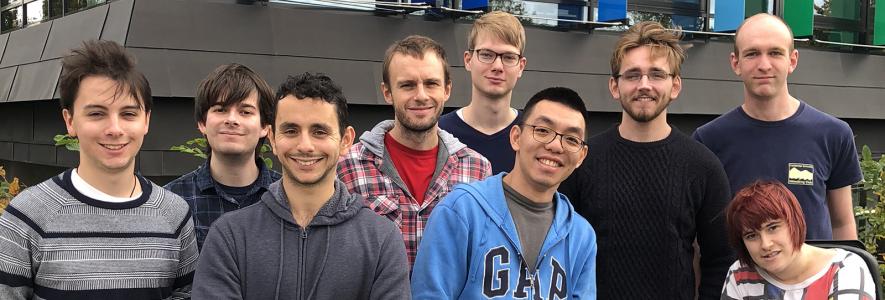
The HEP Group welcomes applications from students wishing to study for a PhD in experimental or theoretical High Energy Physics. We normally have projects available on each of our active experiments, and on various theoretical topics.
More details on the projects, admissions process and what a typical PhD in HEP looks like can be found on this page and also in the slides presented at our Virtual Open Days which are available here.
A PhD takes between three and four years to complete. We also offer one year MPhils (but only in exceptional cases).
We have a limited number of PhD places each year funded by the Science and Technology Facilities Council. These pay the full costs for UK citizens. We do not normally provide direct funding for non-UK citizens, but often offer places to students with funding from scholarships, such as those offered by the Gates Cambridge Trust or from other sources. There are many funding opportunities at Cambridge from a wide variety of sources including the Cambridge Trust, Gates Cambridge, Colleges, departments, Research Councils and central University funds.
The deadlines for applications vary depending on the funding sources - there is some information on this page.
More information on how to apply can be found here.
Please ensure that you provide the name of at least one Principal Investigator in the HEP group who could act as your supervisor on your application form. You don’t need to have contacted this person in advance but it means that your application can be processed more easily. Potential options include (Matt Kenzie, Harry Cliff, Oleg Brandt, Tina Potter, Chris Lester, Sarah Williams, Leigh Whitehead, Steve Wotton, Bart Hommels, Alex Mitov, Ben Gripaios). You can put more than one.
High Energy Physics (Experimental)
The main focus of our research is with the LHCb and ATLAS experiments at the LHC and with the current and future neutrino experiments MicroBooNE and DUNE. We are also involved in smaller experiments, such as searching for ultra-light dark matter using novel atom interferometers (MAGIS and AION). As a member of one of these collaborations you will benefit from access to rich and varied datasets and you will have the opportunity to make leading contributions to the analysis of a physics topic chosen with your supervisor. You will develop new analytical skills and learn state-of-the-art methods for the exploitation of the data. You will be part of a large and dynamic international collaboration with many opportunities to engage with your co-researchers both in Cambridge and at CERN or Fermilab.
Our group also plays a leading role in R&D activities for future detectors and upgrades with an emphasis on silicon sensors for tracking and single-photon-sensitive sensors for particle identification and we encourage our students to become involved in our R&D work. We are currently offering a PhD studentship jointly with RAL to explore novel techniques to exploit high precision timing information for a future LHCb RICH upgrade.
A selection of possible experimental projects is presented here
High Energy Physics (Theoretical)
Our group is interested in a range of theoretical problems with a phenomenological emphasis (that is, with relevance to current or future experiments). We have close contacts with the Cavendish experimental high energy group and with the more mathematical theory group in the Department of Applied Mathematics and Theoretical Physics (DAMTP). There are also collaborative projects with groups at CERN and elsewhere in Europe and the UK.
See also:
Current research interests include:
- Search strategies at the LHC for new physics beyond the Standard Model, for example supersymmetry, black holes etc.
- The development of improved Monte Carlo simulations for high-energy collisions incorporating higher-order perturbative corrections.
- Determination of the probability distributions of partons in the proton to high accuracy, with particular emphasis on implications for LHC physics.
- The effective Lagrangian approach to understanding Quantum Chromodynamics at low energies, and its application to the properties and interactions of hadrons.
More details on possible projects are available here.
You may be eligible for multiple funding sources and we encourage candidates to apply for Cambridge Trust scholarships as well as Research Council scholarships. To make sure you are considered, please submit your application by
-
15th October 2025 for Gates Trust funded graduate students (USA residents) , 2nd December 2025 for non-USA residents.
2nd December 2025 for Cambridge Trust funded graduate students.
2nd December 2025 for Research Council funded graduate students.
How can I find out more?
A great way to meet supervisors and learn more about the projects is to attend the register in advance to attend.
We've tried to answer most common questions on the FAQ page, so please read this first.
If you have further questions please contact the Rutherford Hub Administration by email, by phone (+44 (0)1223 76 8138 or +44 (0)1223 33 7478) or by post at:
HEP Group,
Cavendish Laboratory,
JJ Thomson Avenue,
Cambridge,
CB3 0HE,
United Kingdom.
Further details can be obtained here together with application forms.
Further details on research opportunities can be obtained from:
- Matt Kenzie (email, phone +44 (0)1223 33 7228) for experimental research,
- Ben Gripaios (email, phone +44 (0)1223 76 1014) for theoretical research.
The University also has a lot of information for Prospective Graduate Students.
